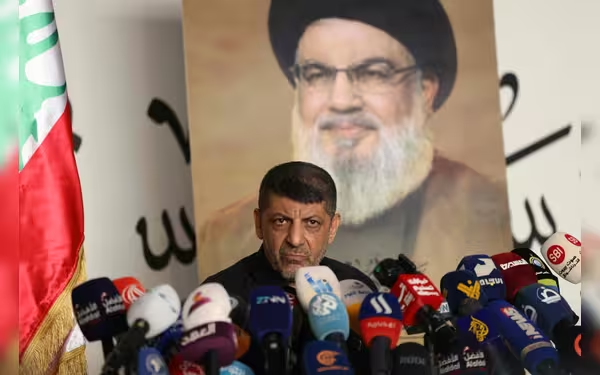Saturday, November 16, 2024 08:30 PM
Hezbollah Claims Israeli Army Unable to Occupy Lebanese Villages
- Hezbollah asserts Israeli forces cannot occupy Lebanese villages.
- Israeli airstrikes fail to diminish Hezbollah's missile capabilities.
- Ongoing conflict raises humanitarian concerns for civilians.
 Image Credits: arabnewspk
Image Credits: arabnewspkHezbollah claims the Israeli army is unable to occupy Lebanese villages amid ongoing conflict and military operations.
In recent weeks, the conflict between Hezbollah and the Israeli military has intensified, drawing significant attention from around the world. The situation escalated when Israeli forces launched cross-border ground operations against Hezbollah in southern Lebanon, marking a notable increase in military activity in the region. This comes after a series of airstrikes targeting Hezbollah positions, which began in late September.
Hezbollah, a powerful militant group backed by Iran, has publicly stated that the Israeli army has been "unable" to occupy any Lebanese villages since the start of these operations. During a news conference in south Beirut, Hezbollah spokesman Mohammad Afif emphasized, "After 45 days of bloody fighting, the enemy is still unable to occupy a single Lebanese village." This assertion highlights the ongoing resistance from Hezbollah fighters, who have reportedly repulsed Israeli troops in key areas such as Khiam, located just six kilometers from the border.
The Israeli military's strategy, as outlined by Prime Minister Benjamin Netanyahu, aims to secure the northern border of Israel and prevent Hezbollah from rearming. Netanyahu has indicated that the operations are designed to push Hezbollah back over the Litani River and to respond firmly to any actions taken against Israel. However, despite these military objectives, Hezbollah claims that Israeli attempts to penetrate their defenses have largely failed, particularly in areas like Bint Jbeil.
Recent footage verified by AFP has shown significant explosions in the village of Mais Al-Jabal, illustrating the destructive impact of the ongoing conflict. Hezbollah has accused Israel of attempting to create a "no man's land" along the border, a tactic that raises concerns about the humanitarian implications for civilians living in these contested areas.
In a striking statement, Afif asserted that Israeli airstrikes have not diminished Hezbollah's missile capabilities, citing their recent targeting of suburbs in Tel Aviv with Fateh missiles. This claim underscores the group's continued military readiness, despite the challenges posed by Israeli operations. According to a report from the Center for Strategic and International Studies, Hezbollah is considered one of the most heavily armed non-state groups globally, with an estimated arsenal of 120,000 to 200,000 rockets and missiles.
As the conflict continues, questions about a potential ceasefire arise. Afif mentioned that there have been contacts between major world powers, including Washington, Moscow, and Tehran, but he noted that no official communication has reached Hezbollah or the Lebanese state regarding a ceasefire. This uncertainty adds to the complexity of the situation, as both sides appear entrenched in their positions.
The ongoing conflict between Hezbollah and the Israeli military remains a critical issue with far-reaching implications for regional stability. As both sides continue to engage in military operations, the humanitarian impact on civilians in Lebanon and Israel cannot be overlooked. The situation calls for careful monitoring and a concerted effort from the international community to seek a peaceful resolution, ensuring that the voices of those affected by the conflict are heard and addressed.













